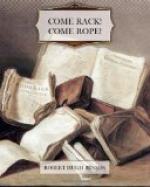Now and again she thought of Robin. She wondered whether he, too, one day (and not of necessity a far-distant day, since promotion came quickly in this war of faith), would occupy some post like that which this man held so gaily and so courageously; and for the first time, perhaps, she understood not in vision merely, but in sober thought, what the life of a priest in those days signified. Certainly she had met man after man before—she had entertained them often enough in her mother’s place, and had provided by her own wits for their security—men who went in peril of liberty and even of life; but here, within the walls of London, in this “wolves’ den” as Father Campion had called it, where men brushed against one another continually, and looked into a thousand faces a day, where patrols went noisily with lights and weapons, where the great Tower stood, where her Grace, the mistress of the wolves, had her dwelling—here, peril assumed another aspect, and pain and death another reality, from that which they presented on the wind-swept hills and the secret valleys of the country from which they came.... And it was with Father Campion himself, in his very flesh, that she had talked this evening—it was Father Campion who had given her that swift, kindly look of commendation, as Mr. Babington had spoken of her reason for coming to London, and of her hospitality to wandering priests—Father Campion, the Angel of the Church, was in England. And to-morrow Robin, too, would be here.
* * * * *
Then, as sleep began to come down on her tired and excited brain, and to form, as so often under such conditions, little visible images, even before the reason itself is lulled, there began to pass before her, first tiny and delicate pictures of what she had seen to-day—the low hills to the north of London, dull and dark below the heavy sky, but light immediately above the horizon as the sun sank down; the appearance of her horse’s ears—those ears and that tuft of wayward mane between them of which she had grown so weary; the lighted walls of the London streets; the monstrous shadows of the eaves; the flare of lights; the moving figures—these came first; and then faces—Father Campion’s, smiling, with white teeth and narrowed eyes, bright against the dark chimney-breast; Alice’s serene features, framed in flaxen hair; and then, as sleep had all but conquered her, the imagination sent up one last idea, and a face came into being before her, so formless yet so full, so sinister, so fierce and so distorted, that she drew a sudden breath and sat up, trembling....
... Why had they spoken to her of Topcliffe?...
CHAPTER III
I
It was a soft winter’s morning as the party came down the little slope towards the entrance-gate of the Tower next day. The rain last night had cleared the air, and the sun shone as through thin veils of haze, kindly and sweet. The river on the right was at high tide, and up from the water’s edge came the cries of the boatmen, pleasant and invigorating.




